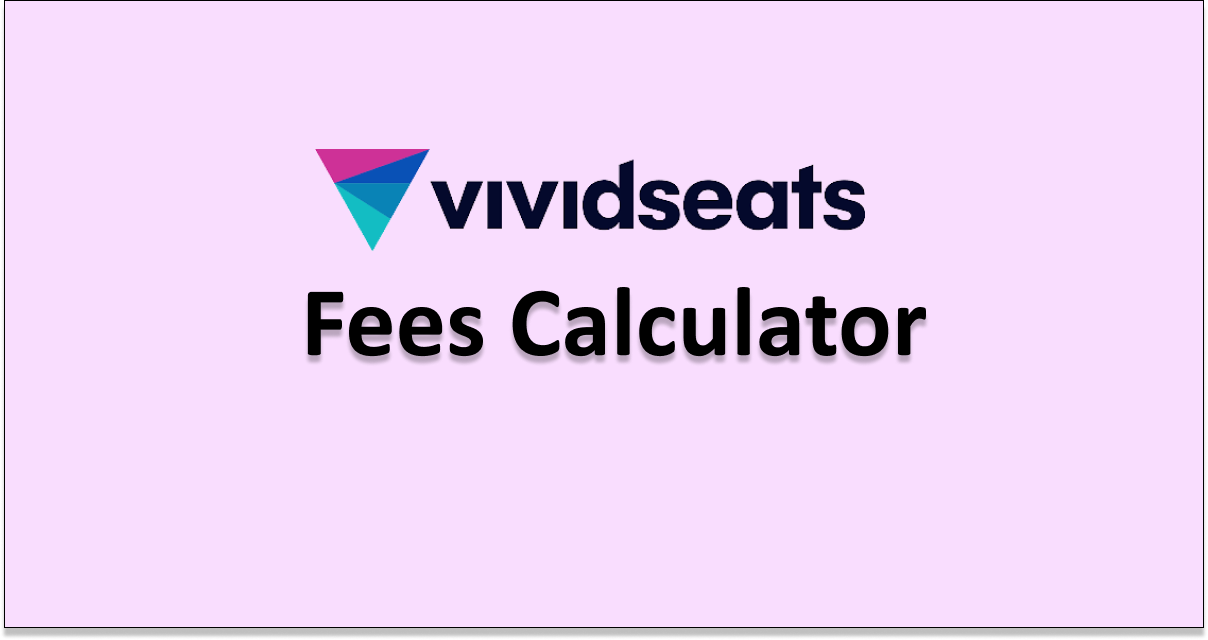How Much Are Seller Fees On Vivid Seats? A Comprehensive Guide For Smart Ticket Buyers
Buying tickets through Vivid Seats can be a game-changer, but understanding how much are seller fees on Vivid Seats is crucial before you hit that checkout button. Many people get caught off guard by unexpected charges, which is why we’re here to break it all down for you. Whether you're snagging concert tickets, sports events, or theater shows, knowing the ins and outs of seller fees will save you money and stress. So, let’s dive in and figure out what you’re really paying for!
Let’s face it—ticket resale platforms like Vivid Seats are super convenient. You can find tickets to almost any event, but the catch is that seller fees can sometimes feel like a hidden trap. It’s not just about the face value of the ticket; there’s more to the picture. This guide will help you navigate the world of seller fees so you don’t end up with a nasty surprise when you’re trying to enjoy your favorite gig.
Don’t worry, we’ve got your back. From breaking down the exact costs to offering tips on how to minimize fees, this article will ensure you’re making the best decision when purchasing tickets through Vivid Seats. Let’s get started and make sure you’re fully prepared for your next big event!
Understanding Seller Fees on Vivid Seats
First things first, what exactly are seller fees on Vivid Seats? Simply put, these are additional charges added by the ticket seller to cover their costs, including listing fees, processing fees, and sometimes even profit margins. These fees are separate from the platform fees charged by Vivid Seats itself, which can add up quickly if you’re not careful.
Now, here’s the kicker—seller fees can vary wildly depending on the event, the popularity of the tickets, and even the seller’s pricing strategy. Some sellers might charge a flat rate, while others tack on a percentage of the ticket price. It’s essential to check these fees carefully before finalizing your purchase.
Breaking Down the Costs
Let’s break it down step by step:
- Seller Fees: These are the charges set by the individual seller and can range from 10% to 30% of the ticket price.
- Platform Fees: Vivid Seats itself charges a service fee, which is usually around 15% of the ticket price.
- Shipping Fees: Depending on how you want your tickets delivered, shipping can cost anywhere from $5 to $20.
- Taxes: Don’t forget about sales tax, which varies by location.
So, if you’re buying a $100 ticket, the total cost could easily reach $140 or more once all the fees are factored in. That’s why it’s crucial to do your homework before committing to a purchase.
How Much Are Seller Fees on Vivid Seats Typically?
Alright, let’s talk numbers. On average, seller fees on Vivid Seats range between 10% and 30% of the ticket price. However, this can fluctuate based on several factors:
- Event Popularity: Tickets for high-demand events, like Taylor Swift concerts or Super Bowl games, will naturally come with higher seller fees.
- Seller Reputation: Trusted sellers may charge slightly higher fees, but they often offer better guarantees and customer support.
- Market Demand: If an event is sold out, sellers can jack up their prices and fees knowing buyers have limited options.
For example, if you’re buying a ticket to a moderately popular event, you might see seller fees around 15%. But for a blockbuster concert, those fees could skyrocket to 30% or more. Always double-check the total cost before proceeding to checkout.
Why Do Seller Fees Vary So Much?
There’s no one-size-fits-all answer here. Sellers set their fees based on a combination of factors, including:
- How much they paid for the ticket initially.
- The current demand for the event.
- Their own business overheads.
- Whether they’re offering additional perks, like expedited shipping or customer support.
It’s important to remember that Vivid Seats doesn’t control seller fees—they’re determined by the individual sellers listed on the platform. This means it’s up to you, the buyer, to compare options and choose the best deal.
What Are the Other Fees Besides Seller Fees?
Besides seller fees, there are a few other charges you need to watch out for:
- Platform Service Fees: As mentioned earlier, Vivid Seats charges around 15% of the ticket price as a service fee. This covers their platform usage and transaction processing.
- Convenience Fees: Some events or venues may add convenience fees, especially for digital tickets.
- Shipping and Handling: If you opt for physical tickets, you’ll need to factor in shipping costs, which can vary depending on the delivery method.
It’s worth noting that digital tickets are becoming increasingly popular, which can help reduce shipping fees. However, some sellers may still charge a small handling fee for e-tickets.
Can You Avoid Seller Fees Altogether?
Technically, yes—but it’s not always practical. The only way to avoid seller fees entirely is to buy tickets directly from the original venue or event organizer. However, this isn’t always possible, especially for sold-out events. In such cases, using a platform like Vivid Seats is often your best bet, even with the added fees.
That said, there are a few strategies you can use to minimize seller fees:
- Shop around and compare prices from different sellers on Vivid Seats.
- Consider buying tickets closer to the event date, as sellers may lower their fees to offload unsold inventory.
- Opt for digital tickets to avoid shipping costs.
How to Minimize Seller Fees on Vivid Seats
Now that you know what you’re up against, here are some practical tips to help you save money on seller fees:
- Use Price Comparison Tools: Websites like SeatGeek and StubHub offer price comparisons across multiple platforms, including Vivid Seats. This can help you find the best deal.
- Check Multiple Listings: Don’t settle for the first listing you see. Browse through different sellers to find the one with the lowest fees.
- Be Flexible with Seating: Sometimes, tickets in less desirable sections come with lower seller fees. If you’re okay with sitting further back, you could save a significant amount.
Remember, the key is to be patient and thorough. Taking a few extra minutes to compare options can save you a lot of money in the long run.
Is It Worth Paying Higher Seller Fees for Better Tickets?
This depends on your priorities. If you’re attending a once-in-a-lifetime event and want the best possible experience, paying higher seller fees might be worth it. However, if you’re just looking for a good time without breaking the bank, opting for cheaper tickets with lower fees could be the way to go.
Ultimately, it’s about finding the right balance between cost and quality. Don’t let high seller fees deter you from enjoying your favorite events, but also don’t overspend unnecessarily.
Real-Life Examples of Seller Fees on Vivid Seats
Let’s look at a couple of real-life examples to illustrate how seller fees work:
Example 1: You’re buying a ticket to a moderately popular concert for $150. The seller charges a 20% fee, which comes to $30. Vivid Seats adds a 15% service fee ($22.50), and you opt for standard shipping ($10). The total cost ends up being $212.50.
Example 2: For a blockbuster event, you find a ticket priced at $300. The seller charges a hefty 30% fee ($90), Vivid Seats adds its 15% service fee ($45), and you choose expedited shipping ($20). In this case, the total cost balloons to $455.
As you can see, the fees can really add up, especially for high-demand events.
What If You Find a Better Deal Elsewhere?
If you find a better deal on another platform, don’t hesitate to switch. While Vivid Seats is a great option, it’s not the only game in town. Websites like Ticketmaster, StubHub, and SeatGeek often offer competitive pricing, so it pays to explore your options.
Understanding the Fine Print
Before finalizing your purchase, always read the fine print. Look out for:
- Any additional charges that might not be immediately obvious.
- The seller’s return policy, in case the event gets canceled or rescheduled.
- Delivery options and timelines, especially if the event is coming up soon.
Being informed can save you a lot of headaches later on. Remember, once you’ve clicked “buy,” it’s often difficult to get a refund, so make sure you’re happy with the terms before proceeding.
What Happens If the Event Gets Canceled?
In the event of a cancellation, Vivid Seats has a buyer protection program that ensures you’ll either receive a refund or be offered tickets to a rescheduled date. However, this depends on the seller’s policy, so it’s always a good idea to confirm the details upfront.
Final Thoughts: How Much Are Seller Fees on Vivid Seats, Really?
In conclusion, seller fees on Vivid Seats can vary significantly depending on the event, seller, and market demand. While they’re an unavoidable part of buying tickets through a resale platform, there are steps you can take to minimize these costs and get the best deal possible.
Key Takeaways:
- Seller fees typically range from 10% to 30% of the ticket price.
- Always check the total cost, including platform fees and shipping charges.
- Compare listings and use price comparison tools to find the best deal.
- Be flexible with seating and delivery options to save money.
So, the next time you’re wondering how much are seller fees on Vivid Seats, remember to do your research and shop smart. By following these tips, you’ll be able to enjoy your favorite events without overspending.
Now that you’re armed with the knowledge, why not share this article with your friends who might also benefit from it? And if you have any questions or experiences to share, feel free to drop a comment below. Happy ticket hunting!
Table of Contents
- Understanding Seller Fees on Vivid Seats
- How Much Are Seller Fees on Vivid Seats Typically?
- What Are the Other Fees Besides Seller Fees?
- How to Minimize Seller Fees on Vivid Seats
- Real-Life Examples of Seller Fees on Vivid Seats
- Understanding the Fine Print
- Final Thoughts: How Much Are Seller Fees on Vivid Seats, Really?

Vivid Seats Fees Calculator NetworkBuildz

Vivid Seats Fees Calculator NetworkBuildz

Vivid Seats Fees Calculator NetworkBuildz